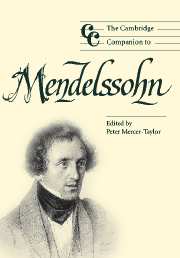Book contents
- Frontmatter
- Introduction: Mendelssohn as border-dweller
- Part I Issues in biography
- Part II Situating the compositions
- Part III Profiles of the music
- Part IV Reception and performance
- 13 Mendelssohn received
- 14 Wagner as Mendelssohn: reversing habits and reclaiming meaning in the performance of Mendelssohn's music for orchestra and chorus
- Notes
- Select bibliography
- Index
14 - Wagner as Mendelssohn: reversing habits and reclaiming meaning in the performance of Mendelssohn's music for orchestra and chorus
from Part IV - Reception and performance
Published online by Cambridge University Press: 28 September 2011
- Frontmatter
- Introduction: Mendelssohn as border-dweller
- Part I Issues in biography
- Part II Situating the compositions
- Part III Profiles of the music
- Part IV Reception and performance
- 13 Mendelssohn received
- 14 Wagner as Mendelssohn: reversing habits and reclaiming meaning in the performance of Mendelssohn's music for orchestra and chorus
- Notes
- Select bibliography
- Index
Summary
It is impossible to separate any discussion of approaches to the performance of the music of Felix Mendelssohn (and therefore conducting Mendelssohn) from the thorny and troubled history of the reception of Mendelssohn's music since his death in 1847. The dynamics of listening are such that when a performer is determined to make a case for the music that is at odds with a reigning albeit reductive sense of a composer's aesthetic, audience expectations will offer resistance. Whether a conductor implicitly or explicitly concedes an established construct of Mendelssohn or not, a particular set of prejudices is present, derived from the standard account of Mendelssohn in music history. In that standard view Mendelssohn is distinct, in terms of surface, sound, and meaning, from Wagner and late Romanticism. This assumption of a stark contrast between Wagner and Mendelssohn concedes the Wagnerian version of the development of nineteenth-century music. The consequences are that one should not expect to hear nearly so radical a disjunction in basic performance practices and sound between Mendelssohn and, for example, Beethoven and Schubert. Yet the audience expects such a contrast when it comes to Wagner, vindicating the idea that Wagner's music and aesthetic contain a stark originality. This may apply as well in a subordinate way to Liszt. The self-justifying rhetoric of the “new” German school has been integrated into our approach to performance. Wagner and Liszt have been set apart from their predecessors by succeeding generations in a manner that suggests a fundamental paradigm shift, requiring a different approach to performance.
- Type
- Chapter
- Information
- The Cambridge Companion to Mendelssohn , pp. 251 - 268Publisher: Cambridge University PressPrint publication year: 2004



